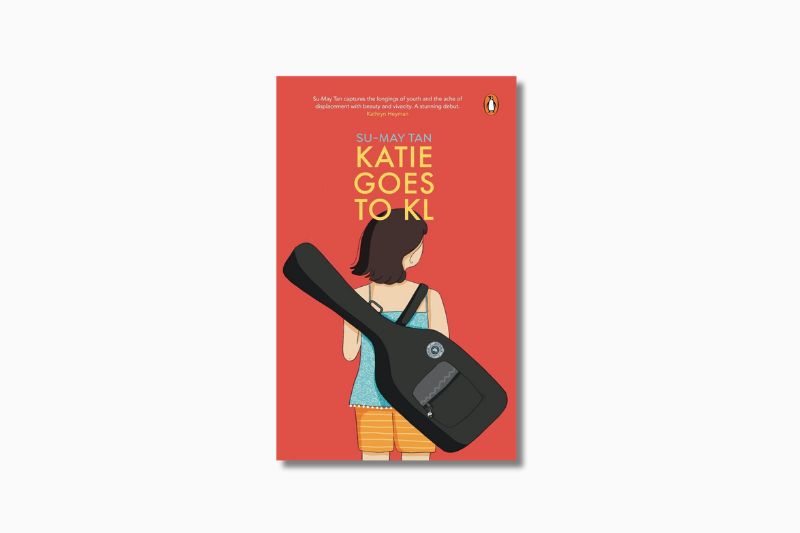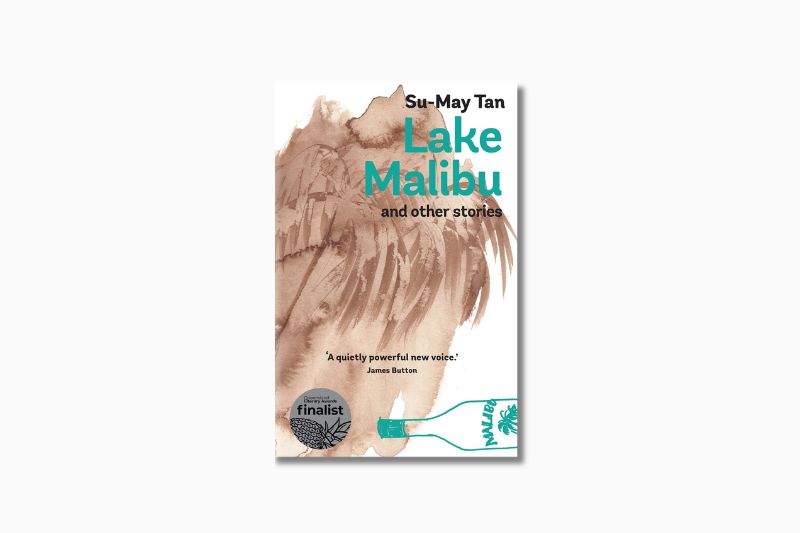
Born and raised in Kuala Lumpur, Tan moved to Melbourne in 2012 for 'a change in lifestyle' (Photo: Amy Su-May Tan)
For the longest time Amy Su-May Tan used to wonder why she wrote. Was it to connect with people? Was it self-expression? Or, was it because as a child, she saw The Joy Luck Club on shelves with “Amy Tan” emblazoned in gold on the cover and thought, “Ooo, that would be nice.”
With her second book out in stores some months back, there is more to writing than seeing her own name on the cover, Tan finds.
“I think I write to work out a question I have in my head. Lake Malibu and other stories was like my ode to Malaysia … a patchwork quilt of the people and places I love about the country, connected in erratic and unexpected ways.
“Katie Goes to KL is an extension of that theme, a displaced person’s search for belonging. Where is home for an immigrant? Where do they fit in? I’ve kind of answered these questions so maybe my next story will be based in Australia, especially now that I’ve been here so long.”
Born and raised in Kuala Lumpur, Tan moved to Melbourne in 2012 for “a change in lifestyle”. It was more her husband who wanted it, she adds.
Katie was inspired by how Tan’s own children, now 15, 13 and five, perceived Malaysia whenever they returned for the holidays — “feeling alien in a place that could technically be their ‘home’ and not appreciating or understanding the beauty of the country.
“Most of Katie’s experiences are inspired by mine, I reckon, such as having multiracial friends, being exposed to political movements and growing up in a country with underlying racial tensions.
“The book is set in a fictitious Malaysia, however. I left more than 10 years ago and have not kept up with the news. I imagined a country that had become more extreme and conservative, and created a ‘villain’ in the form of a traditionalistic political group, which may very well not represent current conditions.”
katie_goes_to_kl.jpg

Published by Penguin Random House SEA, the young adult novel is about Katie Chen, who came to Australia when she was five and lost her mother two years later. Now 16, she lives with her somewhat reclusive Malaysian father and wonders who she really is.
When her grandmother dies, Katie returns to KL for the funeral and finds out that her mother is Malay, and not dead, as she had thought. As she struggles to reconnect with mum, she is drawn into the city’s underground music scene and the simmering tensions of a nation alien to her.
Lake Malibu was Tan’s attempt to teach herself creative writing. This debut collection of interlinked stories revolves around people trying to break away from things that repress them, such as societal pressure and parental expectations, to pursue a better life in another country.
She wrote the first tale maybe 15 years ago and soon realised she had a bunch of them, about different Malaysians with something in common — they were all lost, lonely souls trying to find their place in the world. There is a boy who falls for his best friend’s mother, a waitress who befriends a social outcast, an elderly mother who re-evaluates her relationship with her son who has planted roots in Australia, and two teenagers from Ipoh dreaming of greener pastures overseas in the titular work.
“The themes are actually very similar to Katie— identity, belonging, migration — but they run across different characters who appear in multiple stories. They defy convention and are trying to figure out where they fit in society.”
Tan tells their tales in chronological order, so readers may meet the same characters in different stories, as they grow. Following the same timeline — from the Japanese Occupation in 1945 to present-day Australia — we see Malaysia, a large part of the backdrop for Lake Malibu, casting off colonial rule and evolving into an Asian country and now, a global nation.
Yes, when writers look to the past for ideas, distance, memory and nostalgia can alter their views. “But fiction gives you liberty to explore anything you want, wherever you live, whether it’s Malaysia, Australia or Batu Pahat,” Tan says. “For me, the questions happen to be migration, identity and belonging.”
_lake_malibu_and_other_stories_.jpg

Katie may be inspired by her children and their “displacement” but it is really about the country she knows and remembers.
“I have a feeling the Malaysia where I grew up, in a kebangsaan school with friends from different races, is not the same anymore. When I think about it, I [remember] sleepovers at my Muslim friend’s house, visiting Hindu friends for Deepavali, late night chats at the mamak and bonding over music, regardless of what race we were from,” she says.
Music and multicultural friendships were all part of her teenage and young adult years in KL and there were no issues about these.
“[What] I did try to explore with Katie is her self-identity. In Australia, she feels slightly out of place being an Asian in a predominantly white country. When she goes back to Malaysia, she feels even more out of place. So, her quest is to figure out where she belongs in this globalised world.”
Of Tan’s immediate family, only her parents are in KL and she returns every two or three years. First-generation migrants will eventually adapt to their new country, but deep down, home will always be the place you grew up in, she believes.
“Funnily, over the years, I feel a greater nostalgia for Malaysia and the slightest thing can evoke a pang. Like hearing the drums of lion dance music or eating delicious ang ku [red tortoise cake].”
As the world becomes more blended, with increased geographical crossover and fluidity in traditional and social media, home can be anywhere one chooses these days. Over the last five years, Tan has seen a surge of Malaysians in Melbourne, where she lives in the part that belongs to the Wurundjeri, the “Manna Gum” people.
She supports the movement to acknowledge First Nations people as the traditional custodians of the land and thinks it is a great way to “celebrate the Aboriginal heritage of the country and remind people whose land this was originally — and always will be”.
It is said outsiders are more observant of what is happening around them than locals. Reviewers have praised Tan for bringing out the smallest details in her writing — an innate ability, she reckons.
“I’ve always been an observer of detail. I’m more show [than tell]. I like painting a picture for readers and letting them work out movements and responses, or even what surroundings and things in the scene could convey.”
The solitariness of writing suits her nature but finding the time to do so is hard. She has woken up early to write before work, after her children are asleep, or while waiting for someone at karate class or gymnastics. “I only did this for a year as I was too burned out after that. It is not sustainable.”
Tan remembers doing structural edits for Katie between 1am and 4am before heading for World Vision, where she works as a copywriter, after dropping the kids off at school. “Again, it is not something you can do long term.”
She has always liked to write and grew up on books by Enid Blyton, Alfred Hitchcock (the Three Investigators series) and Sidney Sheldon — not very literary, but the only things available at the time. Now she likes Neil Gaiman, Gail Honeyman and Jhumpa Lahiri, and books such as Convenience Store Woman (by Sayaka Murata).
Despite her early interest, and immersion, in literature, Tan studied accounting and finance because “my mother was paying for my course and she said you can’t get a proper job with an arts degree”.
She worked as an accountant for a year but moved to advertising and has been a copywriter since.
The manuscript for Lake Malibu won a few prizes, one of them being the Carmel Bird Digital Literary Award 2021, which led to it being published by Spineless Wonders. But it was not until the collection made the Queensland Literary Award 2022 shortlist that Tan felt more confident it was good.
“I was so thrilled that a book about a bunch of Malaysians could be considered Australian literature and be shortlisted alongside local literary masters such as Tony Birch and Mirandi Riwoe.”
Taking that first step is always the hardest but there are many inspiring and affordable courses online on creative writing, like the Gotham Writers Workshop. Tan, who read articles about writing whenever she could, did her first such course with Silverfish (now Pakka English) founder Raman Krishnan many years ago. “It was so interesting and liberating to learn about stories for the first time, and to get writing exercises — it didn’t even feel like homework!”
Purchase 'Lake Malibu and other stories' here or go to Kobo or Amazon for digital copies. 'Katie goes to KL' is available at Lit Books and Kinokuniya bookstore.
This article first appeared on July 15, 2024 in The Edge Malaysia.


